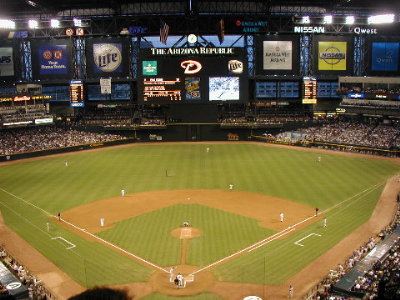
There may have been a time in days gone by, when the game was a more romantic one, that baseball players were felt to be part of a community. The first baseman was a guy you could have a beer with. And in many cases, you probably could see that first baseman at the local bar after the game.
Nowadays when a player does something for the community, 9 times out of 10 it feels like a cynical ploy to garner goodwill on the team's part (or the player has done something wrong with the law and is doing it as part of his community service obligation). The game has become a jaded business enterprise. Most of the joy of the game has been eroded away at the major league level by scandal and bad behavior. A person's favorite player rarely stays with one team anymore and in the case of a small-market team, like the Pirates, the favorite player may only be there for 4 or 5 years before he gets too expensive.
As a result, players have been reduced to pawns on a chess board played by business moguls. In today's game, the new wave of GM's have realized that young players are a valuable commodity. For the first 3 full years of a player's career, the team is only obligated to pay them the minimum salary which ranges from roughly $400,000 to $450,000 during those 3 years. The 3 years after that, the player can go through the arbitration process in which he can be paid 40%, 60%, and 80% of his true market value (as determined by an arbitrator if it gets that far). Only after 6 full years does that player achieve true free agency.
This new wave of GM's has made these young major league players and the prospects that percolate through the minors into the equivalent of stocks in the stock market. A player garnered on the international market, like Heredia or Exicardo Cayonez, can be thought of like an Initial Public Offering. IPO's are usually reserved for the sexy stocks in the business world or technology sector. With the international players, there's a buzz around these players before July 2 (the IPO's announcement date in the stock market analogy) and no one really knows for sure how much the international player will sign for at the end.
A player garnered through the regular draft in June (players from the United States, Canada, and Puerto Rico) is more like a regularly traded stock. The first round players, even with the high signing bonuses and sometime-major league contracts, are paid well below their true market value they could garner as free agents. Think of these players within the first 10 rounds as companies that most people on the street have heard of and would be able to purchase. Jameson Taillon would be like a mid-size bank, not a BNY Mellon or Wells Fargo, but maybe a PNC...a solid investment as a stock but affordable for anyone to buy the stock as part of their portfolio.
Players after the 10th round, who for the most part sign for $20,000 or less, are like penny stocks. Everyone gets a "hot tip" from time to time from a friend, or a friend of a friend, about a stock that is guaranteed to take off in the very near future. This could be, hypothetically, an oil exploration company that has a sizeable option on a huge tract of land in an unstable African country. You think, "What the heck. If it hits, I'm swimming in cash for just a small investment." Then you wake up one day and read that the President of this banana republic has died and the country has been taken over by the military junta. And then the bottom of the oil industry falls out. Hypothetically of course. Needless to say, that penny stock didn't develop as you hoped, but you really didn't invest much. That's like a 35th round pick signed for $5000.
And just like the real stock market, there are the true blue chips stocks. The Apples, the Googles, the Berkshire Hathaways. These stocks are usually very expensive and it seems like you always buy them high. There aren't sales on these types of stocks. You're buying them knowing their past performance and can safely project their future. You buy them to buffer your portfolio, not necessarily get rich off them. These stocks are equivalent to the first tier of free agents each year. This year, Cliff Lee is like Google. When Alex Rodriguez was a free agent the first time, he was like Apple....Apple was already pricy, but you knew it/he was still going up in performance.
Essentially this human stock market serves to de-humanize these players. You sometimes just think of them as assets and forget they are real people. I sometimes catch myself thinking in a very mechanical fashion about these players, trying not to get too attached to them. Because you never know when a company will buy out your company or when your company will go bankrupt.





